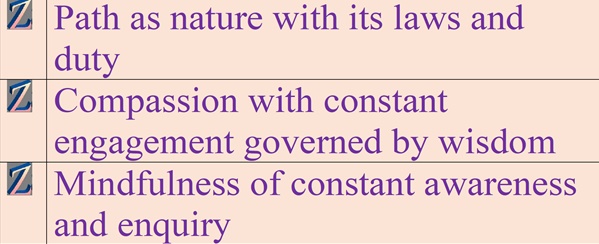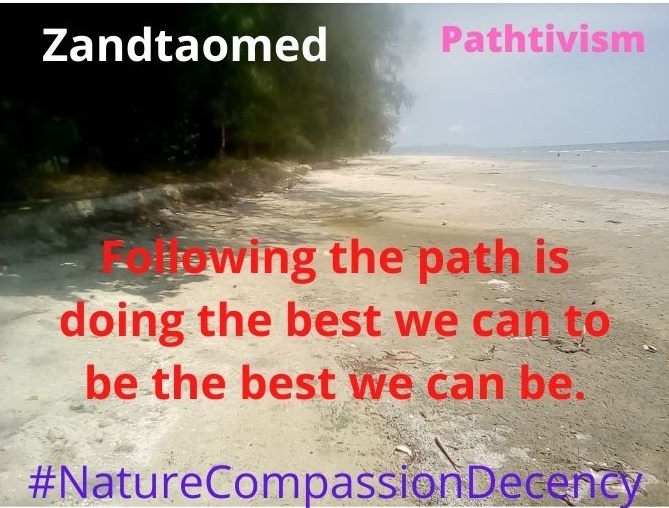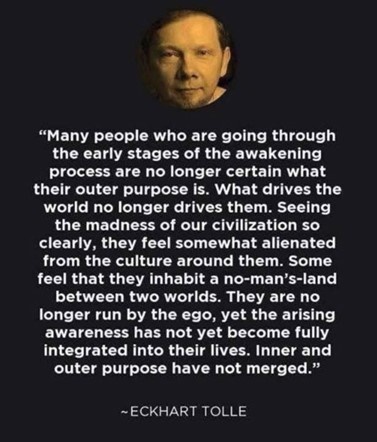|

It has become fashionable to call out people supposedly on the spiritual path by using egoic criticisms such as spiritual bypassing, spiritual narcissism or maybe other terms. The real question that matters within this criticism is this – are those people being criticised actually on the spiritual path? The problem has been worsened by some who follow dogmatic teachings, fail to find the spiritual path, and then blame the teachings as not being “correct” – however their limited understanding chooses to describe “correct”. In a world where following the spiritual path is often mocked, this increases negative pressure on an already difficult situation – starting on your spiritual path.
And there are further problems – the Wellness industry and McMindfulness. Are these people following their spiritual paths? Do people in the Wellness industry recognise the spiritual path? Is their Wellness a prelude to the path or is it a healing that enables them to cope in society? Are those engaged in McMindfulness using their sati to follow their paths? Or are both “bypassing” the path (different usage of the term) because they have been hijacked by the economic system? How do we follow our paths when we are being compromised by the system we are trying to be aware about?
What is the spiritual path? In the path section of Viveka-Zandtao, I have discussed this but what is written is not objective. I have some understanding of my own path but other than that I do not know for certain whether anyone else is following their path. When I listen to Batgap I hear many and varied personal histories of people describing their relationship with the path. These people have been heroic in their struggles to follow the path in such a defiled world, but in the end I can only take their word that they are following their paths. There is no objective definition as to whether someone is following their path.
Now consider academia, a place where many criticisms of spirituality come from. To me the history of academia immediately excludes the institution itself from being a place to consider spirituality. I go back to the split of spirit and reason as marked by Francis Bacon. In his attempt to understand he framed understanding and wisdom as two sources – the source of spirit and religion and the source of reason. Academy, the place where wisdom and knowledge were examined, initially sought their understanding in both ways, but over time such understanding became limited to that which can be verified by logic and reason – often through scientific method; I call such academia science – verifiable by logic and reason, it is scientific materialism.
In many spiritual traditions this academic limitation has been rejected. It is firstly rejected because spiritual knowledge has been eschewed from science, as spiritual source of understanding or wisdom cannot be verified by logic and reason. Prior to Bacon such spiritual understanding would have been considered understanding, wisdom or knowledge, since the Bacon-split academia has been limited to verifiable by logic and reason essentially leaving spirituality outside academia. Whilst people in academia can have a spiritual side, appeals to insight or wisdom are not given the same credence as knowledge that has come from scientific method.
Fundamentally the spiritual path appeals to insight and wisdom, and different traditions consider both insight and wisdom as fundamentally true. The spiritual path can only be experienced and understood through insight and wisdom, intellect is not capable of experiencing that understanding. This gives academic institutions a dilemma. Whilst individuals within the institution might understand spirituality, the very institution is of intellect and verifies through logic and reason. Because the spiritual path cannot be verified by logic and reason, spiritual path with its wisdom and insight is not recognised as a source of knowledge – it is not formally recognised academically. Spiritual leaders have attempted to reunite spirit with reason such as HH Dalai Lama starting the mind and life institute (about here). But this is not however mainstream academia.
There is a further major stumbling block concerning the acceptance of spirituality. Spirituality is experienced – experiential. I am happy to say that I am following my spiritual path to a greater or lesser extent, but I pointedly offer no proof. Without proof academia would not accept me as a “follower of path”. Let alone would they accept statements I am prepared to make about the path:-
 There is no greater human experience than following the path. There is no greater human experience than following the path.
 If all people followed their path, then the world would not be defiled – full of greed and hate. If all people followed their path, then the world would not be defiled – full of greed and hate.
 By following the path people can experience great joy. By following the path people can experience great joy.
None of these three premises that I might call spiritual axioms would be accepted by academia because they cannot be measured – they can only be attested to by subjective testimony. Whilst I would argue that such testimony is empirical science – science by observation, mainstream academia does not accept this.
The biggest stumbling block is that academics mostly have not experienced the spiritual path so these 3 spiritual axioms to them are nonsense, and for that reason alone the criticism of narcissism would appear valid. Personally I accept this scenario, I accept that academia has no institutional intent to understand spirituality. I further expect rejection of all that is spirituality, primarily because academia does not verify by subjective experience but through the methods of logic, reason and objective observation.
Would I expect scientific periodicals to present a balanced view on spirituality? No, they cannot because scientific periodicals need to be based on their fundamental tenets of logic and reason.
Somewhat ironically within Buddhism there is a great understanding of causality, conditioning arises out of cause and effect. But there is a shift that occurs leading to the spiritual path, a shift that might be experienced as transcending, a shift that might be considered as going beyond conditionality – beyond cause and effect. Following the path embraces this beyond, but cannot give a rational explanation for it because by its very nature the experience of “shift” is beyond reason.
When we talk to creative people of creativity, do they explain their creativity in terms of causality? No, there are all kinds of explanations about getting in touch with spirit, the Muse, and others, but do they explain their creative process through causality? Academia barely includes the creative, there is an uneasy alliance with the Arts – what I think of as rationalising the Arts by attempting to develop objective criteria. In much the same way that academics might be religious, there is a mutually exclusive acceptance of academia and spirit; faith is accepted but not as part of academia – just individual choice. At no point is the wisdom that comes with the spiritual path or creativity accepted as academic – unless it can be verified.
Again I personally accept this but there is an ego associated with science and reason, that scientific materialism can explain all. When spirit is discussed, the best that is offered by academia is that logic and reason cannot explain yet – but given time??
Given that academia cannot accept spirit and the experience that comes with it, I would expect criticism from its journals. If such journals criticise egoic positions such as spiritual bypassing or spiritual narcissism, I am not surprised. I would not ignore such criticisms but there will not be a balanced view that would include spiritual truth, because such truth cannot be verified by scientific method.
I don’t want to attack academia, I want to explain academic limitations. And further I want to discourage people considering the spiritual path from seeking understanding within academia. If you want to follow the spiritual path, follow it and seek guidance from the spiritual community in doing this. The spiritual path is the greatest experience, if you feel a spiritual awakening dive into it trying to experience it fully.
 Follow your spiritual path. Follow your spiritual path.
 Follow your spiritual path. Follow your spiritual path.
 Follow your spiritual path. Follow your spiritual path.
Will you know what to do? Doubtful to begin with but go for it anyway.
Am I blind to the criticisms? Far from it. Why can't spiritual teachers keep it in their pants? If you are a spiritual teacher and you cannot control your desire, how can you be a spiritual teacher? And yet apparently there are many. And even more confusing some of their teachings are skilful. But in the end if you can’t keep it in your pants, then there is a weakness in your understanding and therefore probably a weakness in the teachings. There are many great teachers out there – with sila, find one.
Spiritual bypassing is an ego but we have to be so careful in describing what someone does as spiritual bypassing. If a teacher spends time in solitude to develop spiritually, is that bypassing or learning? Only the person knows. If a spiritual teacher joins a demonstration for the planet, is that a spiritual act or not? Only the person knows. If a spiritual teacher spends their life as an activist without teaching spiritually, should that be questioned? But to say that spiritual teachers who spend time in solitude without contact are bypassing is judgemental and egoic. To say that all spiritual teachers should spend their lives as activists is judgemental and egoic. What you can say is that at this point in time if I want to spend my life in solitude as a means of escape and I use spirituality as an excuse, then that is egoic. It is your spirituality, your path, and your evaluation; it is between you and your mindfulness. And the most important thing about mindfulness is that ego will always try to trick you; be aware.
Consider the 3 axioms above, are they narcissistic? They sound it but does that mean it is true?

There is no comparison with others - no egoic judging.

I would also say that you would be a better person for following your path. But I would only use such individual comparisons, there is no comparison between people, no comparing me with others, you with others etc. Is this narcissistic? That is for you to judge, but in judging you cannot judge me because you are not in my head – not me. The problem lies in judging, and if we come back to science that is a problem – because science judges. Logic and reason make comparisons but because there is a verified and agreed method for making such judgements it is considered acceptable .... by science but not by spirituality. Can logic and reason make judgements about spirit?
But there is a duty associated with the path, wherever you are on your path, you have a duty to teach – to pass on your understanding of the path as far as you have gone. It matters not how far you have gone, it matters not whether you have gone “further”, it matters only that you pass it on. Within the understanding, within the wisdom, is an imperative to pass it on. This of course appears arrogant if you are being “taught”, especially if you didn’t ask to be taught. But this need to pass on teaching is an aspect of wisdom. There is no judgement, no comparison, no feeling of superiority, just a need to teach. From the halls of academia where arrogance and competitive measuring is common-place, there is a judgement that “teaching” implies superiority. Because they don’t follow the path, they don’t understand that the wisdom of the path carries a duty/burden, it must be taught. Examine facebook or forums about spirituality, everyone is teaching. This does contain a problem of arrogance or narcissism; it is not because those at some stage on their path are following the wisdom imperative of teaching, it is because there is not enough listening; great teachers listen even to those who “ought” to be listening.
If we make assumptions about things we cannot know about, isn’t that arrogance? Ego? If spirit (creativity etc.) is beyond logic and reason, isn’t it egoic to claim that science can make assumptions – be critical?
Criticisms of the egos of bypassing and narcissism have led to criticism of spiritual teachings in general. When you listen to the spiritual people on Batgap, you learn how diverse spiritual paths can be. You also learn there is not an ABC to enlightenment. As a schoolteacher I learned very quickly that the teacher gets the blame; whilst as a schoolteacher I had many faults, mostly the times I was blamed were not because of these faults. Learning from Batgap there are many ways to go, if one way doesn’t work look somewhere else; blaming the teachings or teacher is judgemental, and being judgemental is not usually recognised as skilful.
Within academia psychology is relatively new. Psychology – “the scientific study of the human mind and its functions, especially those affecting behavior in a given context” [Google] – can overlap the world of spirituality. The terms psychology uses are similar terms to spirituality. I am no psychologist nor have I studied psychology, but by the very use of the term “scientific” I find psychology limiting in terms of spirituality. Over my lifetime the importance of psychology and what is happening to the human mind has increased, but have spiritual teachings changed? As a Buddhist my answer is no. Increasingly weaknesses caused by shadow have been highlighted, and spiritual teachings have been criticised for not dealing with shadow giving this as one reason for calling what happens spiritual bypassing.
Whilst the terminology might be new, shadow is not. Integrating repressed egos such as shadow are fundamental to the 4 Foundations of Mindfulness - one established teaching. Inner Child work has also gained increased traction in psychology, and some argue is not part of spirituality. But again I would claim it is part of integration, and in "Reconciliation:Healing the Inner Child" Thich Nhat Hanh helps people converse with their Inner Child and this helps alleviate their suffering. One criticism of spiritual bypassing is that spiritual teachers encourage disciples to follow their paths with the disciple ignoring their shadow – in other words leaving the shadow buried. Such a shadow cannot remain buried, and can (much?) later come back to haunt the disciple. Through being mindful of the 4 foundations such shadows emerge and are integrated. This can be traumatic, and might lead the disciple to question the path. But that integration is part of the path.
Do all teachers recognise that integrating these issues is part of the spiritual path? I don’t know for sure, but there could well be weaknesses especially within institutions. Institutions are usually careful often being open to criticism for socio-political reasons, and with this care their teaching is often dogmatic – to the letter, and perhaps missing the spirit for some. But institutions are not the teachings, and if you cannot get the learning from one institution go elsewhere.
Criticism of the spiritual path is common place in a defiled world. In Buddhism defilements (kilesa) include greed and hatred, if all followed the spiritual path how would a system that benefitted from greed and hate survive? Whilst there is much socio-political complexity, the spiritual path that ends greed and hate is inimical even revolutionary when such defilement is fundamental to socio-political systems. It is no wonder that people are discouraged from following the path. For some awakening to the path is unavoidable as it was for Eckhart Tolle described in the intro to The Power of Now.

When you listen to many on Batgap, dealing with awakening was also unavoidable. But for others, being discouraged from starting on the path might lead to dissatisfaction throughout their lives as they might live with a nagging what-if buried in their minds. My purpose in writing this advice is to ask you not to ignore the problems of ego in the spiritual life but to say take the plunge. If you feel an ounce of awakening try to develop it. Seek advice within the spiritual community – somewhere, there are so many good people. Open up your hearts to the possibility of awakening, and don’t be put off by the criticisms (don't ignore them either).
Awaken, there is so much waiting for you there!!
|


 Zandtao Meditation page
Zandtao Meditation page
 Advice from Zandtaomed
Advice from Zandtaomed


